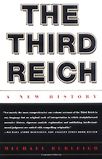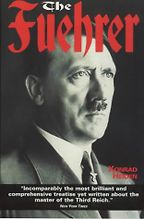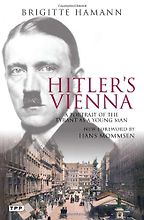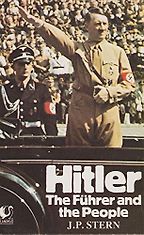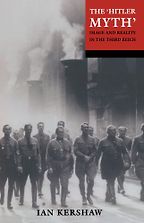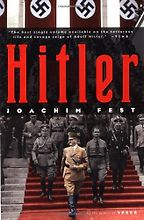Let’s start with the first of the Hitler books you’ve chosen, The Fuehrer. The author, Konrad Heiden, was a journalist?
Yes. For Frankfurter Zeitung. He’s the only journalist of the time who got on Hitler’s case from a very early date and recognised that his oratory and so forth were very powerful, and he pursued him relentlessly. So much so that when Hitler came to power Heiden had to go into exile. I think he worked as a professor of journalism in the United States.
So when you say he got on his case, you mean he got on it in a negative way – he wasn’t a supporter?
He certainly wasn’t a supporter. Rather than an academic writing about it, he did what any good journalist would do and started to look into Hitler’s finances and his relationships with women and all that sort of stuff. He delved. He got down to the grubby detail.
And what was the grubby detail?
Well, things like the fact that Hitler was living with his niece and she shot herself in the 20s under odd circumstances. Presumably his intentions or his controlling nature became too onerous. It took some guts to write about that, given that these Nazis were armed and violent people. Money was coming in from all sorts of covert directions with secret donations from businessmen. It’s a better book than all the ponderous tomes on Hitler, because Heiden was actually there – it’s of the time. I think that can be more interesting than people who write about things afterwards.
Did Heiden know Hitler?
I don’t think he did actually talk to Hitler, no. But he dogged his steps until 1934 when Hitler decided to murder about 80 people, the leadership of the Brown Shirts, and to dress that up as a restoration of good public morality. They were all depicted as a nest of homosexuals who needed cleaning up. He also killed anybody else who had crossed him, like General Schleicher, a previous chancellor, who was shot and, indeed, Mrs Schleicher who opened the door to the assassins. And the owner of a Munich pub who’d annoyed him. Anybody who crossed Hitler in some way got killed.
Tell me about the next of your Hitler books, Hitler’s Vienna by Brigitte Hamann.
Brigitte Hamann was a contemporary Austrian academic who went to great lengths to study his life. It’s quite tricky because Hitler provided his own account in Mein Kampf, which includes an account of his childhood and his time in both Vienna and Munich before and after WWI, so you appear to know. She used an incredible amount of legwork to separate the reality from the mythology. He constructed his whole life, his odyssey, as a form of political mythology.
“He was somebody who never did a day’s work in his life and loafed around, going on a downward trajectory and lived in doss houses before WWI.”
What does the book say Hitler lied about?
Well, for example, he says he conceived his hatred of Jews when he arrived in Vienna from his home town. The reality was that he was selling his painted picture postcards to Jewish commercial art dealers, who were selling them for him. In the book he says that the people he particularly detests are the eastern Jews from Poland, Orthodox Jews, many of whom were living in Vienna. But there he is having actually quite normal relations with Jewish picture dealers.
You’re surely not trying to suggest that actually Hitler didn’t hate Jews?
No, no! I’m not saying that. I’m saying it’s a bit more complicated. He stereotypes them by saying they’re wandering about the streets in their beards reeking of garlic, but actually most Jews in Vienna were highly assimilated and he was dealing with them.
What else does Hamann dig out about Hitler in the book?
Just his bizarre lifestyle, really. He was somebody who never did a day’s work in his life and loafed around, going on a downward trajectory and lived in doss houses before WWI. He didn’t go to Germany until shortly before the war. Ironically, he was Austrian and didn’t become a German citizen until 1932… Did you know that?
I knew he was Austrian.
But he didn’t get citizenship until 1932, which means that, given his political agitations in the 1920s, he could quite legitimately have been deported if anybody had been minded to deport him. He was trying to avoid serving in the Austro-Hungarian armed forces. He got his papers and fled to Germany.
But why was he in doss houses? He was from a respectable family, wasn’t he?
Well, it’s more complicated than that. It was quite an extended family with a lot of changes of names and peculiarities. He just didn’t have any money, he didn’t work – and there was no social security net, so he went down.
How did he creep up again?
By going to Germany. He claimed that Austria-Hungary was a kind of multi-cultural mishmash that he wouldn’t have wanted to fight for anyway. Whereas, of course, Germany was a different proposition because he was an ultra-German nationalist, so he served as a runner in the WWI on the Western Front.
And lied about that too?
Well, he did get decorated for bravery. One author said the real men in the trenches at the front would have been vaguely contemptuous of him, running backwards and forwards between the command posts where he got given the written orders to take up to the front for the officers to execute. I find that a bit of a spurious distinction though. I mean, there would have been bullets flying around and shells, whether you were a runner or not. I think on one occasion one of the command bunkers he was running for was obliterated by a shell, killing everybody in it.
Are we going to be able to be sympathetic towards him then? Maybe he had post-traumatic shock which manifested itself in…dictatorial madness?
Well, a lot of people had post-traumatic shock and went on to leave unexceptional lives in the post-war period. He was gassed and blinded, which he again dramatises, waking up blinded and gassed and facing Germany’s unconditional surrender. It’s very bizarre – you can see what they were on about in the sense that German armies were way into Eastern Europe on one front and right out in France and Belgium on the other and they hadn’t actually been militarily defeated. They would have been crushed to pieces if it had gone on any longer, but if you were a German soldier you’d have found it all quite mysterious. Of course, Hitler then blamed it on internal subversion.
The book’s title makes it sound like a guidebook to Hitler’s Vienna. Is there an element of that?
She certainly makes it vivid. His obsession with Wagner operas, for example. He went to see Parsifal 70 times or something.
Tell me about J P Stern, the author of the third of your Hitler books, Hitler: the Fuehrer and the People.
He was a literary scholar who applied much more attention to matters of language, looking at the rhetorical concepts that someone like Hitler was using. So everything gets reduced to these militaristic concepts of struggle and battle. Really, it’s about the way in which someone like that successfully turns his own quite odd life story into the story of a country. All political extremists do this. You convert your individual grudge or grievance into a bigger narrative. That would be true of Islamist radicals in this country right now, as well as Nazis. Someone like Hitler successfully made his own life story emblematic.
It’s incredibly interesting from a psychoanalytic perspective. Everybody tries to make the outside world match their inner world and if your inner world is very disturbed… Hitler was actually creating an outside world to match his inner one.
Yes, exactly. He was making himself into an animated version of the unknown soldier on the war memorial. He was the ordinary person who came back to articulate the alleged views of the people killed in their millions in the First World War.
He’s also enacting a massive omnipotent fantasy.
Yes, on the largest scale. J P Stern is very well placed to talk about his, as he knows about language, probably from reading Karl Kraus, the great inter-war satirist who also wrote very astute things on all this. Hitler’s speeches have very particular patterns in them. It’s essentially the redemptive story – there we are down in this abyss and I’m going to lead you out of it.
Watching them as someone who doesn’t speak German, he doesn’t look like a great orator. He looks like a complete psychopath, shouting and waving his arms.
No, no! I don’t think that at all! I’ve listened to lots of his speeches, including things like opening a motorway or something, and you’d be surprised at the level of economic analysis, and then, of course, there are these moments when he just goes off on a completely wild tangent, whenever he touches upon the subject of Jews. Like all anti-Semites.
“The Hitler Myth is about how grannies would knit socks for him, about the whole interaction with the German people”
Supposing you and I were having lunch and one of us looked down at the salt cellar and said: ‘It’s a well-known fact that the Jews monopolised the Medieval salt trade in the South of France.’ That’s what he would be like and that would lead on to some other aspect of their perfidy.
What did Jews mean to him, do you think?
That’s an incredibly complicated subject. In a way there’s a type of contempt and hatred with a sneaking admiration for their biological pertinacity. That they survive everything. It’s a love-hate relationship, though with a great deal less love, obviously. What I mean is that he would have thought they maintain their racial integrity, which he admires.
So, there’s a sense of belonging that he doesn’t have.
Yes. And it’s a very complicated relationship. If you go to Israel the Polish Jews always talk about the snobbery of German Jews, who are the most cultured and sophisticated. The most German, basically. Ironically, they were assimilated and non-religious so that their point of identification was with German culture.
So you do think he was a great and charismatic orator?
Of course. He must have been. It’s also the way in which he offers a transgressive temptation. In other words he is inviting you to think dark thoughts. He’s articulating dark thoughts people had in their heads anyway and giving them voice.
Like a racist joke? It’s OK if it’s a joke?
A bit like that, yes. He’s tempting people to think things and go along with things he’s articulating. The whole thing was set up and he would deliberately hold the speeches in twilight or in darkness, all of which he says he got from being inside Catholic churches which use twilight and candlelight to manipulative effect. He deliberately set out to do that because people become emotionally susceptible in that kind of environment. If you factor in the darkness, the flaming torches, the drum rolls and trumpet blasts it would have been almost tribal in its power. It was quite deliberate. Also because he didn’t get up for most of the day. He didn’t surface until late in the day. He reversed time. He was a night operator. They all were. Stalin was another one.
The fact that Hitler had never had a job would, you’d have thought, make it terribly difficult for him to run a country, an army, a war.
Well, it was very frustrating for the nine-to-five bureaucrats. It would have disordered orderly government and then the other annoying thing if you were a general was to have some little bloke who constantly harped on about his worm’s eye experience of WWI to people who’d been to the most intellectually rigorous staff colleges of the world. They’d spent five years doing this intellectual training to be told by this little jerk: ‘What do you know? I was there.’
Tell me about the next of your Hitler books, Ian Kershaw’s, The Hitler Myth.
I know he’s written a huge two-volume biography. If that’s what grabs you… but it doesn’t grab me. His earlier book, The Hitler Myth, is much more effective because it looks at how he interacted with the German people and how his image was manipulated after he got into power to turn the negatives into pluses. For example, the fact that he was sexually dysfunctional and had non-relationships with women was turned into the idea of the Führer denying his natural manly instincts to work all the time for Germany. This is an old trick. If you think back to Ingres’s portraits of Napoleon at his desk at three o’clock in the morning with the candles all burnt out. It’s a pretty constant form of image making.
Why do we think that he was sexually unsuccessful?
God knows. I’ve never thought about that one. People just think he was. No, The Hitler Myth is about how grannies would knit socks for him, about the whole interaction with the German people. Rather like any famous person, when they walk into a room you somehow think their eyes have connected with you. If you touch the hand you don’t wash it; you tell your mates you really touched him.
Well, Bill Clinton is good at it, but some famous people make you feel rejected, not loved.
That’s true, but the book is about how he becomes the fulfilment of people’s wishes.
So, maybe he was quite characterless. He made a whole country his projection but he also received a whole country’s projections at the same time?
Yes, I’m sure he did.
That must mean he was quite a blank slate?
That’s the thing. Having read lots about Hitler and all his own ruminations, his informal ramblings, his Führer monologues (because somebody was jotting down everything he said late at night, on such subjects as what soup the Spartans drank – seriously) he does come across as something of an enigma. There was nothing there. Everybody was desperately trying to keep their eyes open and he was going on about how marvellous it was that it only took a few hundred Brits to keep down millions of Indians – that’s what we need to do.
So there was something key missing?
Yes. Maybe it’s like any sort of problem – you’re missing the most simple thing. But the more you look at it, it’s like there’s nothing there. It’s hard to explain. There’s a lot of feeling but it all seems quite bogus and empty.
That’s terrifying. It’s so much more frightening that there’s not much there than that he’s the incarnation of evil.
Of course, the strict theological definition of evil is the absence of good, so it does actually suggest a vacuum, oddly enough. So it’s right.
If you can take any projection from little grannies to sexual excitement in young women, it means you can absorb anything.
Yes. I read a very interesting book once, a German book that consisted of all the letters ordinary people wrote to Hitler. They are extraordinary. Some of them are just opportunistic, a baker wanting to call a cake a Hitler Torte. Hitler said no. And marriage proposals. Endless marriage proposals.
Tell us about the last of your Hitler books, Joachim Fest’s biography, Hitler.
He died a couple of years ago. He was the editor of Frankfurter Allgemeine Zeitung. He was a very grand German journalist who also wrote marvellous history books. It’s beautifully written and very astute about him. Obviously he finds him to be an appalling individual. He spends a lot of time talking about whether or not he’s a ‘great’ historical figure, who made a huge impact on his time. I’m ambivalent about that since all he left were ruins and dead people. But it’s a brilliant biography of him as a politician and warlord. It’s a life of the man rather than an attempt to do the times and somehow to put the man in it. Germans do fewer biographies, in fact. Here and in the US there is so much about fascism because it indirectly bolsters the left as the force of anti-fascism. Nazis provide the left with their anti-fascist credentials.
January 28, 2011. Updated: February 9, 2024
Five Books aims to keep its book recommendations and interviews up to date. If you are the interviewee and would like to update your choice of books (or even just what you say about them) please email us at [email protected]
Five Books interviews are expensive to produce. If you've enjoyed this interview, please support us by donating a small amount.

